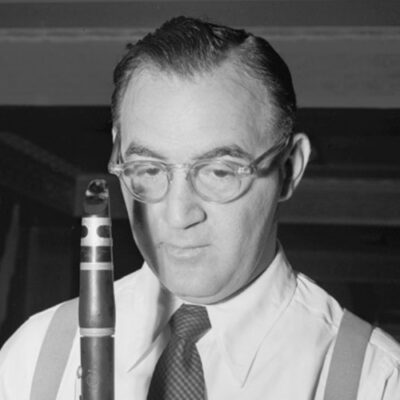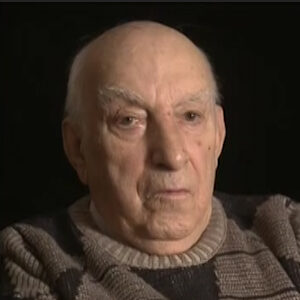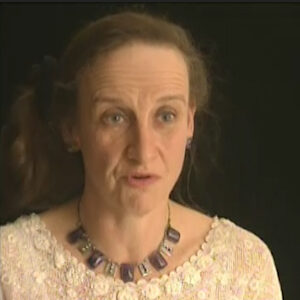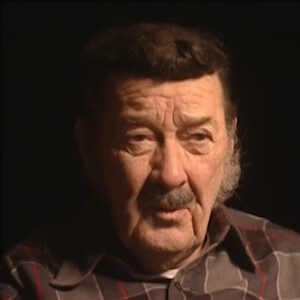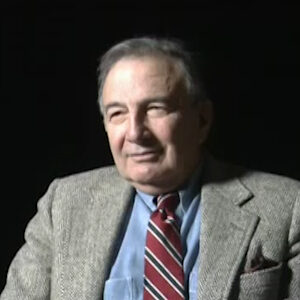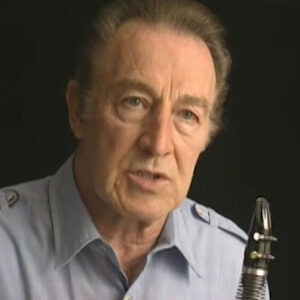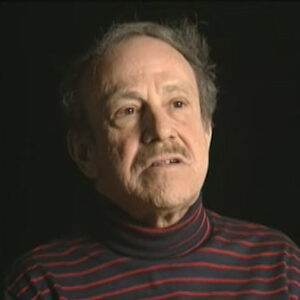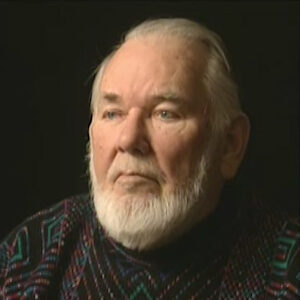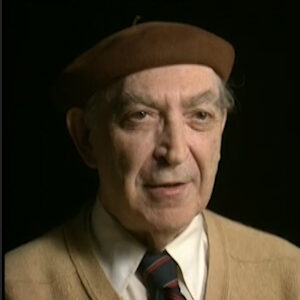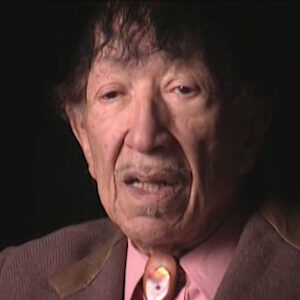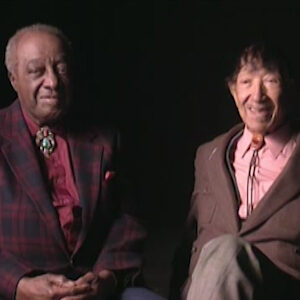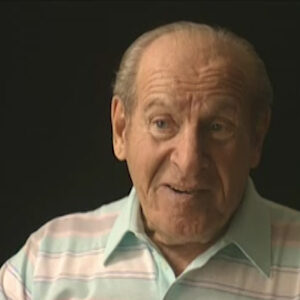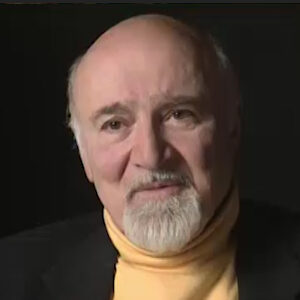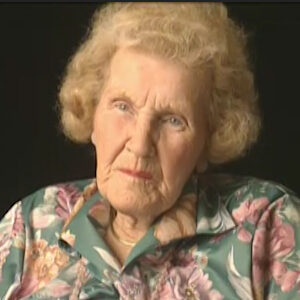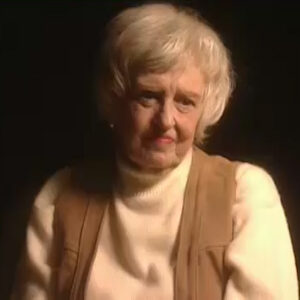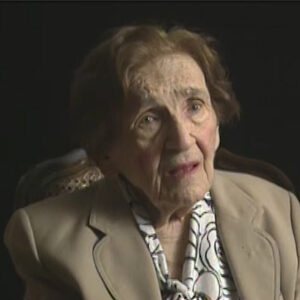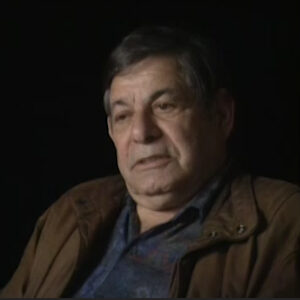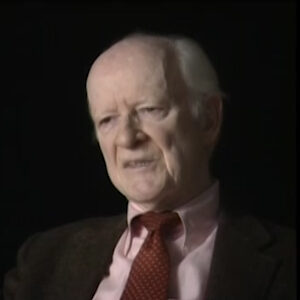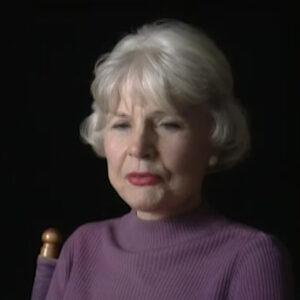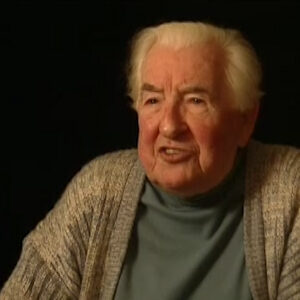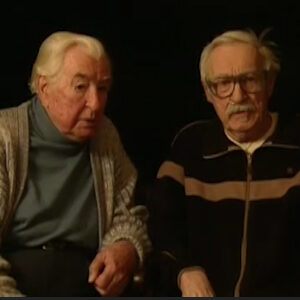Speaker So tell us about the Ambassador Hotel.
Speaker All right. First, you tell me when.
Speaker Although it’s been about half a century since I left the world of jazz, my memories are very vivid, especially about Benny Goodman. One thing we retained our friendship over a long period of time, and one of my favorite remembrances is about the last time we stopped. We saw one another before he died.
Speaker He called me that just again the last time. So what strikes is the last time you are in your chair? I’ve got to keep in shape.
Speaker And I’m here.
Speaker The last time I saw Benny was when he came out of Los Angles and he called me to come down there and have breakfast or brunch or something. That’s all I was a time the provost at Carlos Kalven used to the Earth. I tried to explain some of the protocol of the academic world. Benny didn’t really work and he persuaded me to go and visit him and I did. He was staying at the Ambassador Hotel wherein there is a tail. Since this represented for him a glorious, glamorous past, the Ambassador Hotel at that time was no longer glamorous or glorious.
Speaker But I think Benny was sort of living a dream, reliving those days, those halcyon days for him. And there he was, the ambassador. When I went downtown to his to his hideout and I was somewhat shocked by the inhabitants of the lobby who wore especially short miniskirts.
Speaker But we’ll skip that. And I got in the elevator, got up there to see Benny. I could tell where he was because he was still looking for a read. And you could hear him practicing. Those was way back in the 1940s. There he was.
Speaker Which was actually in the nineteen eighties, about nineteen eighty four or five. And I was walking with a cane at the time. So I came into the room, looked at him, we hugged and I noted that there was very little difference between us.
Speaker We were both all men.
Speaker Whereas when I joined his band, I was 17. He was 30 or something like that. So he seemed to be practically my grandfather. I commented on that and I recall Benny’s wonderful one liner. He looked straight at me and said, you’re going to find out that there’s a great difference between 72 and seventy two and a half.
Speaker That’s that Ambasador story. Is that OK? You think OK.
Speaker You’ve got to be.
Speaker Even though it’s been about a half century since I left the world jazz, my memory is very vivid, especially my recollections of Benny, with whom I sustained a friendship over those many years. I remember distinctly when he called me, it was turned out to be the last time we saw one another. He called me when he arrived in Los Angeles and he asked me to come down and have breakfast or brunch or something like that. And I remember teasing him and saying, who’s going to pick up the tab, you or I? And he agreed he would pick up the tab. So I did get down there. He was saying at the Ambasador and this represented for him, I suspect, timewarp. This was the time of in his mind, the time of his great glories and the healthy and days of triumph, glamour and blitz. It was a few blocks away in Palomar Vom Ballroom, where he had great success, his first large success. Well, there we were. I came into the lobby, I looked around and I saw some.
Speaker So we’ve got to we have to go through.
Speaker I don’t know is any good was right, but we can take it from. You got something useful or tough? If I do this one more time and we’ll go out the window, you understand it from what was good? Where would where would be the place to go from? I came down to the Ambassador Hotel. We’ll be able to the pictures. Okay. All right. So I say, Martha. Okay. She’s now hidden. I think.
Speaker Thank you. Only one. Uh.
Speaker Benny persuaded me to come on down to the Ambassador Hotel where he was staying.
Speaker I recall that my impression was that Benny was living in the past. His view of the Ambasador was not really accurate at this time. It was of a rather different hotel than the one it was when it was glamorous and glitzy and full of all those lovely things. When I came into the lobby, I noticed in particular that the inhabitants wore very short mini skirts and very strange cosmetics. I shall not comment further on that. In any case, I found my way up to Benny’s room. Very easy to find him because there he was practicing. I could hear him searching for reasons all candidates are always doing. There he was. I walked in walking with a cane at the time I looked at him and my first comment after we hugged was how strange it is. Look at us now. We’re both old men. Whereas when I was in your band, I was 17 and you were 30. There was a vast difference between us. There was no such difference between us. Now, he said. Oh, just a minute. You’re going to find out that there’s a great difference between 72 and 72 and a half.
Speaker It was worth doing again, the punch line was even better delivery. Okay. Yes, I think I made Palomar. We’ll get it. You’ll get it. The problem is that we can get.
Speaker The is. No. Excuse me, just like my thoughts here. Here we go.
Speaker I was being trained as a concert pianist. At the beginning of my musical career by a very, very, very, very severe German lady, Sarah Barg. And my younger brother may rest in peace. Was the chance.
Speaker Have you ever get started? My older brother. My younger brother. Sorry.
Speaker My younger brother, Lloyd.
Speaker May he rest in peace.
Speaker Was the jazz aficionado. And he said to me, we must go down to the Paramount Theater because Benny Goodman is there and he is the king of swing. I really wasn’t quite sure what swing was. I really was not sure who Benny Goodman was. I knew what the word king meant. And so we borrowed a quarter or something from my mother and went down to the Paramount Theater. And I must say, I feel sorry for those today who have not had such an experience. Perhaps they have with rock and roll in Metro. But to see and hear when the stage began to rise and the lights were on, those golden instruments and they sounded like like a pack of hungry lions roaring. It was absolutely thrilling. We were not terribly sophisticated. We were in the front row, which we shouldn’t be, because the stage causes you to go, you know, bend your head all the way back. However, it did net us one gain, and that was a Malad from Lionel Hampton. But in any case, we stayed for about five shows. I still remember the movie because one had to stay in the seat. It was made of Salem with the closet. It. There’s something for historians. It was it was absolutely marvelous. And I heard at that time players like. Teddy Wilson at the piano.
Speaker OK, great. Yeah, from the guys you heard.
Speaker We heard some of the most remarkable musicians in the jazz world. Lionel Hampton was playing mallets in one of the advantages of being in the wrong seat. Was that when he tripped up and allow Ramallah to fly out of his hand. We actually caught it. I don’t think I still have it, but we kept it for a long time. We came back quite ecstatic. And I had to prepare my piano lesson. I now had learned that there was such a thing as improvisation. It was explained to me prior to this next lesson, and I thought I would take a shot at it. I remember that I was studying the very first piano sonata, Beethoven. And my teacher came in expecting me to have prepared at least the first movement which I had prepared. However, I decorated it a bit. I added a few curlicues here and there, which I thought Teddy Wilson had been playing. That netted me an enormous crack with a ruler on my hands and the horrified look on my teachers facing Melvin. What in the world are you doing? And I turned rather heartily and said, Well, I’m improvising.
Speaker Is it this useful? That’s great. OK. Oh, don’t, don’t. Rather than take all the time for one second the plane. I’m sorry. I’ve got a cleaner start.
Speaker Not long after the clap on the knuckles from my piano teacher, there, I was at the Paramount with the Benny Goodman Band. And that reminds me of how paternal Benny could be, probably because of my tender age. Sometimes when Peggy Lee would be singing with the band is Paramount. Benny would come over to the piano and he and I would go into heavy consultation. We were in the dark. Spotlight was on the Peggy and many people would notice some of the critics wrote about how we planned things during that moment. That wasn’t the case at all. Actually, he was asking me a good father that he was playing. Did I save my money and do I have any annuities going? And I said, Benny, I’m 17 years old. I want to take a girl to the movies.
Speaker That was that thing about that little thing. Now, what would you like? Let’s go back to your audition for him. OK. How we found out about you.
Speaker Actually, my own first professional engagement as a jazz pianist. All right. My own first engagement was actually not being human. It was a down in Greenwich Village, a place called Knick’s. I think jazz history now has a particularly exalted place for Nicks in its chronicle. And there I was, quite young, of course, playing with Eddie Condon and Ernie Concerns and Bobby Hackett and Zerilli Singleton or George Witling sometimes. And I do remember that I had to be hidden in the men’s room whenever the union delegates came because I was much too young for all this stuff. In any case, that’s where I was when I got the call from Benny, come and play for him. And the people I was playing with in the village felt that I was a traitor. I was betraying the gospel, the true jazz in the village and going uptown to these people who had converted jazz to an industry in a very negotiable one. Nevertheless, there there I was going up there and auditioning for Benny. And I remember that his secretary, Muriel Zuckermann, was there. The two of them were listening to me.
Speaker The way I’ve heard the story many times is that Benny turned to Muriel and said, is he any good?
Speaker And Muriel said, yes, I think he’s very good. Not only that, he’s very handsome.
Speaker That didn’t kick you out of the band.
Speaker All. I thought of a story, an audition story. All right, let me see. Can I do it? Yeah, that guy’s dead. Oh, fine. No, I was just thinking about Leibel. Yeah, okay. Oh, this is wonderful. I’m done now. I know where they go, whether you use or. You tell me when to go.
Speaker You look at me. I’m sorry. You know, this was a time when singers were not quite so important as they became shortly thereafter. And there was a thin young fellow with Tommy Dorsey. His name was Frank Sinatra, who is beginning to help Tommy sell records. So Benny thought maybe the time had come for him to hire a male singer. Well, he had never done this before. He always had Helen Ward, Helen Forest Lee. Probably the most famous of all of them. And but now he was going to audition a male singer to take. Out to California where the band was going at that time. Now, what’s remarkable about the story is that Benny said to me, well, can the two of us tell whether a guy can sing? And I said, I’m sure we can. We’ll go downtown, meet all these people who want to join your band. However, I should add one further thing. I was about to marry Martha Scott, whose previous husband had already threatened to break every bone in my body. Now, in came the male singers. And suddenly in came a six foot four magnificent specimen, probably a football player, an athlete and so on, so forth. And I said to Benny, this is our man. It’s the exact opposite of Frank Sinatra. Here’s a big, big, big fellow. He’s marvelous. And he said, Don’t you want to hear him sing? And I said, no, but I want him to be my roommate.
Speaker That’s true. You know, it was I don’t want. I don’t know whether he still is art lond, which is the reality of getting a job, who ends up getting me out? Because I, I was afraid that Carlton, her first husband, would kill me. So so I guess I kept them. Is that clear?
Speaker Okay. Yeah. Were you you weren’t you weren’t still with with anyone. Frank actually did sing with no parent. Where I left. You mentioned Peggy Lee. Let’s talk about that story anywhere in Chicago. Good.
Speaker This little offshoot from that I think is very interesting. Now, see, we could do the Peggy story.
Speaker OK.
Speaker One evening in Chicago, we were playing at the famous Sherman oh, pardon me, famous what Sherman is doing. Sorry.
Speaker Okay, here we go. And throwing it was a nice thing you said before. Just to remind you that I was here when you were Chicago. You did what Benny said because he was an old Chicago head. And he was.
Speaker Yes.
Speaker Whenever we were in Chicago, I always chose to do exactly what Benny said because Chicago has been his town. He knew where the good food was and so on, so forth. And the two of us went out to dinner one night. He was very disturbed because Helen Forrest was leaving the band, by the way, at that time. Singers and sidemen, instrumentalists were constantly commuting between Benny Goodman and Artie Shaw. If anybody offered an extra three and a half dollars, he would probably he or she would probably make the move to the the other one. There were not that many musicians around. So it was it was really commuting, as I called it, in. In any case, Benny was quite concerned and needed to have a new a new singer to take on foris place. So we were having steak and wine and so on, so forth. And there was a girl singing. And Benny said to me what he must have said to Muriel years ago in relation to me.
Speaker He said to me, Is she any good? And I said, yes, she’s good. And she’s very pretty.
Speaker We meet again, different talent and we’re to go at the same point.
Speaker Right. All right. So Benny and I went out to have dinner, having steak and wine and all sorts of goodies from our ingestion. And there was a girl singer carrying on singing awfully nice jazz tunes, I thought. And Benny, in the middle of gulping, turned to me and said, she any good.
Speaker And I said, Recapitulating what Muriel must have said about me. I said, yes, I think she’s very good and she’s very pretty.
Speaker Now, the thing I want to get in, I can do right away, because it’s a very short time. Okay. We’re all. One of the things that I think it’s important to emphasize about Benny is that he was neither a racist nor a sexist. The best way of checking that for me was to note that he could be just as rude to African-Americans as he would be to whites and just as rude to female as he would be to males.
Speaker Are there any stories that can never.
Speaker Well, there were. Well, I remember the very first day when Peggy Lee came to join the band. It always seemed to me to be fairly insensitive to call her Pops.
Speaker I was that there’s one way right now. What are we talking about now? We’re stuck with I remember things first.
Speaker Oh, with this. You asked me to give you an instance about rudeness and sexual. Yeah, but recent sex with you. As a matter of fact, I probably should emphasize we going. Okay. It really is worth emphasizing. Is it. Benny was entirely colorblind.
Speaker And remember, this was in a period when bigotry was rife. But not not with Benny. An instance comes to mind regarding the absence of any sexism.
Speaker The very first time that Peggy Lee came to join the band, Benny, of course, could not remember her name.
Speaker And so indiscriminately he called everybody else Pops. So why not her? He called her Pops. Now, if you can imagine a rather delicate blonde, pretty nervous young girl coming to a record date with Benny Goodman, his band at that time, and being a draft addressed as pops. You have some picture of how what an egalitarian he really was.
Speaker This was like the day after the theater at the hotel. Oh, yes. The very next day. Yeah. And of course, therein lies the tale. I tell that day, like, I have set it up that way. It was the very next day, you know. You tell me when you sit back. I’m sorry. Okay. Can we if you’re more comfortable each that and consider it is okay.
Speaker The very.
Speaker The very next morning, many had a big lead come to the recording studio.
Speaker I still remember the first tune that was given to her. It was named Elmers Tune, a terrible tune by gasoline. And of course, it should be understood that for Peggy to read this stuff was demanding a bit much. I recall John Hammond was in the control room there and he was not terribly happy about Benny’s choice. Both of June and Singer. Now, some of you will not know the name Ellie Sautter, but he was a prodigiously wonderful arranger for then his band. And he had arranged Elmers tune.
Speaker So let’s start again with just Eddie Sautter was a starter set brother and we won’t know, OK? He thought it was a marvelous.
Speaker It is sort of was a marvelous arranger, had arranged this piece. Elmer soon to be sung actually by Alan Forest. So it was not in Bengalese comfortable range. And she didn’t know the tune anyway. And Benny had given her a piece of sheet music. Now she trembled so that in the control room, it sounded like a forest fire was going on. And of course, John Hammond was very unhappy about that. What was also a source of misery, and this is a source of misery for pay, was the fact she had nowhere to command because Edie saw it as very fanciful modulations. So we had to stop. And we took about five minute break. And I said to Peggy, and I must say, this was the beginning of a friendship which had run for about 50 years. I said to Peggy, at that point, it’s come let’s go into the other studio. I’m going to tell you what your cue will be for you to start.
Speaker And the cue was simply going to be dum, bum, bum, bum, bum, bum. I will do that behind all the saxophone stuff and all the brass mishmosh. I will you will just listen very carefully and you’ll hear me. Dum dum, dum, dum, dum dum.
Speaker And that’s what got her to sing Elmers tune. I hope that Peggy would not be made miserable by my retelling of that story.
Speaker OK.
Speaker It’s very interesting to think back to the kind of possibilities they were in rehearsal. I mentioned possibilities because there’s a financial question today. I doubt that any such thing would be possible. But in those days, it was possible for an organized band to rehearse from morning to night if need be. And Benny was a stickler. He was a very careful rehearsal.
Speaker He was not terribly articulate. Let’s say he was not a talker. He had, I think, three words that he used after each attempt to perform. That was one more time. Now, I remember once I think it was in Chicago when we were rehearsing some piece and Benny’s famous three words, one more time being heard perhaps 20 times. And one of the players, I think, for his trumpet player. Somewhat exasperated, said Benny, how many times are we going to hear one more time? And Benny said, rather innocently, he said. Until something happens.
Speaker You was told about how he would not hesitate. You had a relationship with him as an arranger.
Speaker But before you did that, you go for it. The arrangements that he sought or.
Speaker I think it’s fair to say that Eddie Sautter sometimes had a difficult time with Benny, partly because Eddie wrote in a style that was for Benny, quite complex, whereas because Fletcher Henderson, Benny relied so much and indeed myself. We also realized we were simplistic compared to Eddie so often at rehearsal. Some of the most elaborate things that Eddie would write would get the blue pencil Benny would do sort of cross them out and usually substitute a clarinet solo for all of that. Unfortunately, in my opinion, because I think Eddie was an extraordinary writer of arrangements and I did not have this trouble. I did not have to take all those pills that Eddie did because much of what I wrote, I think was much more quasar home cooking for for Benny. So I don’t remember he but also I didn’t invest as much of myself as I think he did. Eddie was an arranger. Resi was not great.
Speaker That was marvelous. You referred to the pills without having right answer. Yeah. We can do it. All right. InterCloud a shot. And Eddie would sit there while he got his pencil out.
Speaker Anyone saw it. All right. From there.
Speaker Whenever Benny would cut some of these sections from sorry, I’m sorry, my fault.
Speaker It seems to be, but this is it. You’re very handsome, Boris. Yes. And I feel like I’ve got a better job at all. And to her, we’re just gonna.
Speaker This is like an it’s like an inch. You okay? Roger. And this is like an insert. Right? Okay. All right. Whenever Benny would get the pencil out to cut sections of it, his lovely, intricate arrangements, he would get the pills out.
Speaker Was that the way to get it or was a little a little too obscure, maybe a little obscure? A little. A little more. All right.
Speaker Well, you know what? That does worry tantalizes or something. Now, describe what he did.
Speaker All right. I think one of the shortest. Yes. Whenever Benny started to cut a part of the sort of arrangements any Sautter would start to digest the batch of tranquilisers.
Speaker A little more economical for us as a family or whatever. OK. Whatever he would have been at the time or the distinguished conductor.
Speaker OK. Ron.
Speaker It was a time when the boundary conditions were very strict between world of jazz and the world of so-called serious music. But already there was beginning to be a very interesting interplay. For instance, we would note in the crowd sometimes Vladimir Horowitz, his name should be pronounced or which we noticed. Bill Primrose, the wonderful violist and very striking. Was a visit old game from time to time. Dimitri Metropolis was conductor of the New York Philharmonic. He was particularly interested in the scores that we were scores that we were using. And there upon there arises a terribly interesting question between actual notation and actual sonic result from the jazz player. So he would come up to us sometimes and say, could I see that as you just played? Incidentally, one that I remember distinctly was the piece at One O’clock Jump, which has all kinds of marvelous filigree at the end of a little trumpet players screaming all over the place, none of which can be found on the sheet music itself. And so he came to me and he said, Could I see what you’re playing? And I showed him the piano and he said, No, no, no. I mean, the piece since you’ve just played it.
Speaker Yes, that’s that’s it. He said, well, where is all that counterpoint to all that stuff?
Speaker And I said, well, that’s part of what’s called for with string will pick it up from there. That’s what’s called for from players in and it’s written in a swing band.
Speaker OK. Was it clear what the hell I was mumbling about? Curtailed.
Speaker I think, you know. Louis and Benny and Louise had brought his rhythm section with him. Betty did. Oh, yes, yes, yes. And if you want to get into the Web or maybe whatever bad drummers you want to say, sure.
Speaker You know, every sorry when we started, you know. Now, what are we talking about, drummers, drummers?
Speaker Then he was especially sensitive to the drummer. He had to have the right drummers in his band and he was terribly fussy. And I suspect very unpopular with the drummers. Part of the reason must be because of Benny’s own rhythmic sense. Very strong. And whenever he came up against someone else who had a very strong rhythmic sense, there was sort of a, you know, a clash of titans going on, which calls to mind that wonderful story. Very famous story about Louis Armstrong, who was once asked, how did he come on stage and play with those rhythm sections that he often had in his band some nights. So very good. And Louis Subversive said, well, you know, I have a rhythm section in my mind. And I usually do not, even if I need to. Otherwise, if it’s good rhythm section, I’ll play with them. Well, Benny was that way about about drummers. And of course, the major crisis took place medevacked when I was still in the band and recording a piece called The Earl with Big Sid Catlett.
Speaker Now, here I just have to have a couple of dots to finish the story, because Big Sid was, to me, perhaps the greatest drama of all. And Benny, on the other hand, couldn’t get along with him at all. Fired him.
Speaker And is what just happened during the euro, having during the recording session, helped tell him that the recording session, if any other details come to mind, what?
Speaker That there was a flare up for what happened, if it’s something to give it a little bit more specific.
Speaker I remember after a take or too many found themselves very unhappy with Beatson Catalyst, which I can’t understand at all. And suddenly he asked bids a big take him suddenly and suddenly he asked, what does it take? So one of your takes, right after one or two takes many forms are very unhappy with the way the rhythm section was going. He described all the difficulty to Big Sid Catlett. And lo and behold, asked him to leave. And so, of course, the record does exist without a new drummer. The record of the Earls was the piece was a piece I’d written to dedicate to Earl Hines.
Speaker We have a whole movie that I guess Vital Muso maybe shot Vito. You know you know something. So, yes, I think you’re absolute. You’re absolutely right. Do this right. Yes. And you’re in it. And I. I’m not sure if is or a little younger.
Speaker Tell it can tell us anything you remember about that garden party or who who might have been there.
Speaker We’re just the only one.
Speaker You know, it’s worth emphasizing that at that time, Benny Goodman was so very famous that one couldn’t walk down the street with him without being mobbed, somewhat like later generations would recognize with, let’s say, Elvis Presley, with the Beatles, with Michael Jackson today and so on. So what he was that kind of pop culture hero. And as a consequence, or at least I’m inferring as a consequence, the Ford Motor Company thought fit to give him a grand Lincoln Continental. This was before, I believe, before the days of the stretch limos. And so there was a very big Lincoln Continental, the gaudiest, most vulgar thing one could imagine. I think it had a sort of clarinet outlined on the out of the passenger side of the car. Also, NBG initials, all of the plays really you needed to have a barf bag. It was terrible taste. Nevertheless, it was a big Lincoln Continental. It was a gift to Benny. And so he asked me to please ride with him this particular evening to get to the one nighter which was being played, if I remember, and I probably don’t. But I know it was probably in Ohio someplace, maybe Sandusky, something like that. And sit in the back of the car was Benny’s brother, who was the manager of the van at the time. There was a lot of nepotism. Freddy Goodman actually is a little older than Benny. But despite being older, he was terrified of his young brother. And therefore, he did not want to tell him as we were driving on this country road that.
Speaker The first profita, Zeke Tzachi. Had two weeks before given notice. Now there’s always this. It was two weeks notice and Benny would have to get another trumpet player.
Speaker Where in the world and said, OK, I’m sorry, did you have some trouble? That means that we’ve got Freddy in. Yeah. So we were on our way to a one night stand. Good night. I don’t think we have for you yet. Oh, no. So I just said we weren’t we were on our way to some Miskin and will have established freedom and Benesch brother Freddie was the manager was in the back seat. Okay. All right.
Speaker We were en route to a one nighter in is in Sandusky, Ohio, and Ben, his brother Freddy was seated in the back seat. I should characterize Freddy as a very fine fellow who was quite comprehensively intimidated by his younger brother. He therefore did not tell him until this very last moment that Zeke Tzachi, the first trumpet player, had already given two weeks notice and was going to leave the band the following day. Now, no one can find another first trumpet player in Sandusky, Ohio, for Ben, his band. You could in San Francisco or Chicago, one of the big cities. So this was a real problem. And as I say, Freddy was terrified to tell Benny about this. And I remember that part of the reason for Zeke leaving had to do with the fact that he was the recipient of the ray from Benny. I’ll explain about that later.
Speaker In any case, Freddie finally mustered up the courage and said, Benny, Zeke is leaving us tomorrow. At that moment, this vast Lincoln limo smacked into a cow that was on the road. Of course, Rome shaken up terribly. Ben got out. I got out. Fred got out and we saw that the call was now an accordion, the cow, of course, was dead. Benny looked to go for a while. And then turn to Freddie and said. Why does Zeke want to do that?
Speaker That was just mentioning those two or some other things that show that you really were just in general that informal like that, the truth.
Speaker The relationship between Benny and myself began with Benny being paternalistic. No question about that. I probably took advantage of that as well. And over the years, he would become less father and perhaps more a colleague. He was especially interested once I left that world and was professor at Yale and writing string quartets and doing what is now called the higher echelon of serious music. You seem very interested in that, and our friendship managed to continue despite the fact that we have gone in very, very different ways. Of course, he always he himself always wanted to play Mozart. He wanted to play other Veber, for example, as well. There isn’t that much literature of the clarinet. And but he’s knew nothing really substantial about the so-called difficult new music, the world in which I now traveled.
Speaker You know, is that anything you needed? Would like you to meet?
Speaker You don’t we when we else. All set.
Speaker Even many, many years later, Benny was still sort of taking care of me. I remember he wrote a very, very serious letter in which he explained that he did not trust doctors at all. I was having some trouble with time. Polymyositis to be accurate. And I was walking with a cane stick.
Speaker And he insisted that he knew the cure, the cure was to go to a nasty bed and to swim every day. And he was terribly paternalistic about that. He insisted that I take his advice as far as the medical application is concerned.
Speaker You’re closer to Benny than a lot of people who were in the band. Were you aware that just came out? To my knowledge, Ross Firestones book of the series back out that he’d had as a very young man at the age of 30. I guess you can operate at the Mayo Clinic. And yes, he was more or less pain all the time. You can tell us anything about that, sort of set it up for us, whatever, you know, that might even procedures you.
Speaker Of course, many himself suffered a great deal from a lower back problem. There was an operation first in effect as a team gold slipped disc which celebrated that operation. But I think throughout his life, he had great deal pain. Very often he would have a specific exercise and he would do lying on the back. Sorry, a specific exercise he would do where you would be on his back on the floor trying to straighten out some limb or other. And I knew about this and I knew that this might very well be in the background for his disillusionment with the surgeons and doctors in general.
Speaker Did he ever complain about the bad things or was he still up about.
Speaker Benny was very, very stoic about all sorts of things. He was very stoic about physical pain. He never let anyone know. Indeed, if I hadn’t seen him going through all that stuff on the floor, I would not have known either. As close as we were. He was very stoic about all sorts of disappointments. I remember when his very youngest brother was killed in an airplane crash. And his behavior then was admirable. The agony was apparent in his eyes, but nowhere else.
Speaker OK. And we have a plane through when.
Speaker Or. Yeah, that’ll be a one liner, Drew. I just. You tell me when.
Speaker Probably what’s been a fairly well-kept secret is the fact that many you come to my house to study harmony theory. He had mild ambitions as a composer. And it turned out that those ambitions were not strong enough to sustain his interests. Because on the other hand, maybe it was in my pedagogical experience at that time, it was not sufficient to keep him happy.
Speaker Set the scene for us a little bit. What? How old were you? What was that? What stage of your relationship with the band, what you’re describing? Give me your partners about something.
Speaker Shortly before being drafted into the Army for World War Two. I became a pedagogue for Benny. Benny used to come to my apartment to study harmony and theory and things of that sort. I think it was ambitious. He had an ambition to be a composer. And he did not sustain that ambition very long.
Speaker Tell about your leaving the band to join the army, or did you?
Speaker They actually left and went to CBS.
Speaker Yes, I came to New York and thought, if you can if you can tell a little bit about the fact here is the phenomenon of the war starting. I started to leave the big bands. And just to give us a stronger perspective. If you don’t mind my using you for that. And then because you were this the experience of the band of the person close to him that went into the army, you also told us were being drafted.
Speaker I mean, wherever however you’d like to make.
Speaker Benny, of course, said Can. Sorry. Let me take another show. This was the famous big band era and Benny, of course, it converted the big bands to big business. He wanted very much to continue with all the players he had. But either he did not read the newspapers or if he did, he was not overly impressed by the fact that we were in a war. I’m speaking because of 1941 42. At that time, it became imperative for me to leave the band, to go back to New York, spend a little time with my family prior to being inducted into the Army. Many songs that didn’t make sense at all from his perspective. And I remember sitting in a room in Boston with Benny and Alice Goodman, his wife and Benny offered. He had the papers all drawn up. The big contract was only he offered to have me start my own band, which he would finance, and he assured me that there’d be no problem. Maybe he would arrange for me not to be drafted. I think at that point he overestimated his authority and underestimated the commitment of the United States to World War to.
Speaker Yes. What do you need? Nothing. That was great. OK. I think I remember hearing that there was a great party before you were inducted. Before you were. Oh, yes. I’d like to bet in any way. No, no, no, I haven’t.
Speaker I have my favorite picture. Teddy Wilson. Count Basie. Duke Ellington. He just got me that one little blonde face with his five year.
Speaker Wonderful. We tell about a good week. I think we can get it. Oh, if we could. The wars.
Speaker We’ll have to set up and make believable that something happened to his career and the war. Was it? First we talk about my set, you know. Here was the war was starting and I was going out to the army. And so we had this party just a little thing. Who was there at the party? Yes. What should have tells this picture was you don’t tell me.
Speaker Well, should not mention the damage. The picture mentioned the folks that they were at this party. A good dinner. Yeah, that’s a heck of a picture.
Speaker Right. Okay, so set the scene.
Speaker The night before I was inducted into the Army, Gaila Party was given for me by some terribly illustrious jazz pianists, Count Basie, Teddy Wilson isn’t Scott and Duke Ellington.
Speaker Do it again and say, oh, you know what?
Speaker I know Scrabble, but at the party, what the atmosphere was, it was fun and they knew I was going off and maybe help the night before I wasn’t done. Sorry.
Speaker He needs to just get up to speed. OK. All right. Jeff.
Speaker Benny was one of the band leaders who did not go into the Army, as you know. Pardon me, sir. Nice. You know, do my talking. Yeah. Here we go. Benny is one of the few bandleaders who was not inducted into the service or the show into the Navy, and many of the others went into the Army, Glenn Miller, of course, notably into the airforce. But Benny’s back problem was very severe and really precluded the possibility of his serving at all. I, on the other hand, was a young Bitel and peppy and ready to go. And so the night before I entered, there was a Gaila party. The spirits were ingested happily and party was given to me. I’m still proud to say by Count Basie and Teddy Wilson. Hazel Scott and Duke Ellington. Not a bad ray of pianists.
Speaker Was send a. Where are you rolling?
Speaker Although I was very young and took great pleasure in getting out of New York, I must confess that it wasn’t always a pleasure to be on the road with the band. I remember particularly one trip when I think we were going from Pittsburgh to St. Louis and the train was very dusty and full of sort and ugly. And Dave Barber, the guitarist in the band who would have a nip now and then, was sort of curled up in a seat and his face had it. I’m sorry to say that awful blotchy red that comes from perhaps too many nips. I was walking down the aisle and I saw him. I stopped and looked down at him. And I remember that wonderful look and that wonderful line. He opened his eyes, looked right at me and said.
Speaker This is living, isn’t it?
Speaker And then that work. Good. Anything about David, Peggy?
Speaker Yes. You know that. A short time thereafter, Dave and Bailey were married. I love what they had to do with it. I mean, that’s their problem.
Speaker Actually, maybe the marriage broke up in our house violent, where he threw the mink coat better. It. This is what’s been ruining our lives.
Speaker A dramatic goodbye. Oh, you want a date?
Speaker Peggy line. Which is less less harmful. Dave had a very typical, to my mind, very typical jazz players kind of humor. A dry was often made out of suffering. And one day, which I remember very well, he was being operated on rather serious.
Speaker Again, I think he had to do much with his imbibing the alcohol. And he was on a stretcher at the hospital. My wife Martha and I and Peggy were at the hospital and he was being wheeled past us.
Speaker Peggy leaned over and said, I love you. And he retorted immediately. Don’t nag me.
Speaker That’s great.
Speaker Can I ask you if you want to break? Well, I’ll tell you a story.
Speaker OK. All right.
Speaker My wife, Martha Scott, and I spent a great deal of time with Alice and Benny, and we always were amused by this odd couple since Alice was a child of the Vanderbilt’s and Benny was the child of street people in Chicago. Never could there be a greater gap between economic and social background than there was there. Very typically, for example, one day Alice was knitting the corner. We were at the Goodmans in the Martha and I were then Alice was speaking where 100 miles an hour, as the British do. She was not British, really spent a lot of time and a first husband was or Duckworth. And Benny suddenly came in from the kitchen with a ream paper and he said, Alice, who’s been eating all this butter?
Speaker By the way, shall we go on?
Speaker That has become a familial expression for us who has been eating all this body? He was born with a great deal of wealth and there was Alice Vanderveldt with some more wealth. And then he was, of course, worrying about the grocery bills. He’s very characteristic of people who were born to poverty. And there’s probably a pattern is probably something that recurs from time to time. An absolute fear of maybe returning to poverty.
Speaker Did he ever talk to you about his childhood or about his father in particular and how his father struggled or what their life was like?
Speaker Despite the fact that Benny and I spent a lot of time together, neither of us presented the other was an autobiography.
Speaker I thought it was economically very, you know.
Speaker Tell me about the trip to Las Vegas, because that ties in with the ties in with the other. You were working and set it up for us that you were working at that time in academia.
Speaker Often you a week. What you make is.
Speaker After I had left, then his band had a call from him asking me to join him in with the sextet to go out to Las Vegas and play. The reason was, to me was quite obvious. Benny didn’t like to rehearse. By this time and he’d rather have people who knew what was going on. You knew the tunes, knew how to play them, so and so forth. And I think what had happened was Teddy Wilson at the time was touring with his own band. And so then he took his second choice and he called me. I was by now already engaged in the academic world. I was at Queens College. In fact, just prior to going as a professor at Yale University and very insistent that I would have a wonderful time in Las Vegas. And moreover, he offered a sum of money that was actually larger than I was being paid all year long by Greens College. So finally, I managed to get leave to go out there with him and we went out to Las Vegas. And I remember our first night and I remember Benny was somewhat like, I suppose Michael Jackson is now his big hero and I mean big pop culture. Your own people came dashing into the main room to hear him. And so he felt that with a reception like that, he must give them their money’s worth. And he played much more than the 20 or 30 minutes that had been desired. I could look offstage and see someone fuming. Turned out to be the owner of the hotel who really had only wanted Benny to be a draw to get people to go into the casino and not to be sitting there listening to him play. So finally, when we started off, Benny obviously expected to have a pat on the back from the owner, instead of which I wish I could imitate this. He had a cigar, you know, that he was shaking and using. Hey, what do you think I’m running here? Gonna give you all or something like that. And so we went on past that into the casino. And I remember Benny saying, well, he doesn’t do much of that, and I kidding said, well, I’m one of the world’s great gamblers, so stick with me and we’ll be all right. Well, we go to the table. Benny was paying so much money to me that week for 20 or 30 minutes a night that I decided I’ll go to the craps table and do what I’ve always wanted to. And I got up there and I got some hundred dollar chips and I was very fancifully playing the game, which I know very well. Benny didn’t quite know what was going on. And I said, no, you just do everything I do and you’ll go home. A very happy fellow. Well, he did. I noticed that every time I put down one hundred dollar chip, he put down a dollar or a five dollar chip was something that sort. And it struck me as a little odd since he was getting I knew I happened to know he was getting seventeen thousand dollars a week. Well, he could do been a net. Finally, because the last role I had all kinds of bets going on the table and I said, now you put out all you put a dollar everywhere or put five dollars everywhere. And he did.
Speaker And he took me to the big role. Yeah. Okay. There are.
Speaker Finally, it occurred to me that I might as well gamble away the entire week’s income. This was the big role in a place bets and all the numbers and a lot of the fancy stuff. And I told them, you know, go ahead, do exactly what I’m doing. I’ve been watching this very carefully. And so many would put a dollar here and a dollar and a dollar there. And then he would take my hand.
Speaker And his hand was sweaty. Now, of course, I’m not a sociologist, but at that very moment, I.
Speaker So you want to be stop. I just. Okay.
Speaker There are finally the time came for a big role where I would gamble away the entire week salary if need be. Win or lose. And I advised Benny, come on, do the same thing. I probably had about, I don’t know, maybe a thousand dollars on the table. And I noticed it put up ten dollars.
Speaker And he took my hand and his hand was wet. It was sweaty. He was frightened. And at that moment, I saw very clearly what early years do have deep roots. Poverty seemed to go even after the roots are no longer justified by reality.
Speaker So those stories really jumped. What did you expect? I mean, you’re talking now about four. So we said, oh, horrifying.
Speaker This was during the 50s when he called me and seduced me away from the academic world for a little while. And it was a time when Las Vegas was least for us old fellows, it was generally Las Vegas. It was being run by the mob. No doubt, who had a certain style, actually. Now, to be sure, if they didn’t like you, you would wind up as a cactus plant out in the desert. But otherwise they wouldn’t really permit you to be unhappy if you lost badly. They would see with you you had a grand steak dinner and possibly even a showgirl, etc..
Speaker Well, of course, this was Las Vegas in the 1950s when Las Vegas was Vegas. It was run by the mob who had a certain style. I must say occasionally when I’m in a very nostalgic mood, I miss that style. They saw to it that no one left in an unhappy frame of mind. If you lost gambling, which most of the time you did, they would see to it that you had Constellation. You would have a wonderful meal. You’d have wonderful wine.
Speaker What the heck is that degree? Well, he’s just getting started with worry until something happens in Vegas.
Speaker Okay.
Speaker This was Las Vegas in the 50s, which means to some of us, this was Las Vegas when it was Las Vegas and it was run by the mob who had a great sense of style. They always took care of you if you did badly at the tables, which was likely the result of your gambling. They saw to it that you had certain comforts. Now, of course, if they didn’t like you, you would very likely wind up as a cactus plant, possibly with eyeglasses and bennies case. But when they did like you, they saw to it that you were not too badly punished.
Speaker They would have wonderful meals for you, wonderful room for you. And from time to time, a wonderful showgirl.
Speaker Better good. Let’s go back to when. OK.
Speaker Just before I was drafted, I decided to become a bandleader and to have among these elegant sidemen a very gifted clarinetist named Benny Goodman. However, we could not use his name because of his contractual imprimatur to say if.
Speaker If we could just sell it more simply that you decided to have a session and you were looking for the best people you could find and you thought of that get.
Speaker And then you could be on Benny. And then he agreed to do it or whatever happened to you. But there was one problem that you couldn’t use. OK.
Speaker And I actually tell you a story that’s gorgeous about Ben, his focus. But I’ll get this in now.
Speaker We know that in a moment of madness, I thought that I would have a record session under my own name. I would be the band leader and asked around for instrumentalists. And there were some wonderful ones in Benny’s band. I asked Billy Butterfield and others. And then when it came to clarinetist, I thought, well, Benny is not a bad clarinetist. How about this? And so I approached him and offered him, I think, scale. He was delighted to do it. However, there was a contractual problem.
Speaker I thought I may as well quit.
Speaker Put it a little tighter.
Speaker There was a logistical problem in that he had a contract that allowed him to be used only exclusively by the company with which he had the contract. So we decided to use fictitious.
Speaker No, sorry to make that as true as they do it. Yeah, there was.
Speaker There was that. There was what? Yeah. Okay. There was a problem in that we couldn’t use Ben his name on the record. So we used a fictitious name, Shoeless Joe Jackson. Not entirely fictitious for you baseball fans, you know. And we went ahead and made the record. And there are people who have said since then that it’s sort of a classic recording with Benny at his very best. And I assume it was because he didn’t have all the problems of being the bandleader. I had to think about those things. It’s a it’s also interesting that Benny’s focus, then his ability to concentrate was so great. And so he was so intense on that recording that I always felt sympathy for him. And I thought probably he ought to be my sideman all the time and not have to worry about all those things.
Speaker Let’s take a look now and tell you this story about concentration. Okay, there probably several you’ll pick up from others. This one is a classic. OK, you tell me when. Yeah.
Speaker A very dear friend of mine is Andre Previn, who was first a brilliant jazz pianist, still is, and then subsequently at a career, has a career as one of the world class conductors for many years out here in Danglers BBC and so on, so forth. In any case, Andre tells me this story that I think is just absolutely the quintessential story of Benny Goodman kind of concentration, his powers of focus. It goes this way. Benny lived up in Stamford near where we were.
Speaker We lived, and he had a music room that he had built there. And he called four musicians from New York to come up, play practice with him. And one of them one day was Andre Piano. I believe as a trumpet player was Charlie Shavers. And it was in February. And I think it was Charlie Shavers who said to him, it’s awfully cold. And he said, oh, is it? Excuse me. He left for a minute.
Speaker And he came back with a sweater.
Speaker That story concentration was.
Speaker One of the very great dramas played in his band was Kozy Cole, well-known to jazz fans. He was a man from, I believe, Alabama or Mississippi, Deep South. He was therefore very different in his manner from that, let us say, the African-American in New York or in Boston. So by which I mean it, kozy seemed to be very mellow, very serene about everything, and had a language that is strikingly different from that of the northern Afro Americans. For example, Kozy never used the second person directly as you. He always spoke of it as your ass. Now, he did not really mean any anything vulgar about the anatomy of the body. It was just the way the second person was spoken in his linguistic experience.
Speaker S every minute. Was that OK?
Speaker Because I want to tell the story that I think we keep it fairly succinct in the greater scheme of things. I guess you’re all right.
Speaker I don’t wanna make too many problems for you in editing.
Speaker OK. This is not a Mel Paul show.
Speaker Alice Goodmans mother was the vanderveldt and she. Or in her 80s. She must’ve been around 80. Forty five. At this time. She wanted to have the Benny Goodman Trio come up to her house and play for her. She was very interested in the piano and she wanted the piano lessons. Very ambitious lady given the Asian van. And so the three of us came up there and I remember how astonished Kozy Cole was when he looked round at all the evidence of boundless wealth, chandeliers and whatnot. And he just kept staring and staring. And then people would come into this large room. When I see a large room, I mean, it would have been suitable for Mussolini when people would come in with their being entails. And so I went over and because he was about religion, Bao, and they said because he was a waiter. And certainly that’s bringing new orders and drinks. And so finally in came Mr. Hammond and Mrs. Hammond Vandervoort, these Alice’s parents. And there was a sort of reception line, small as Benny, myself and Cozi, and as they came to greet us, because to be introduced to me, we all put our hands chicanes and someone. And then came cosies. Stern burned me a picture and then things cosies turned to meet the Hammonds, the owners of all this this extraordinary wealth. And so he put his hand out to Mr. Hammond and said in the immortal words that I shall never forget.
Speaker I’m glad to see that your ass is safe.
Speaker Is it marvelous that somebody is doing well? Oh, Ron.
Speaker I remember Charlie Crist. But let me get this frog out. Excuse me. Maybe just the guys of.
Speaker One of the people I remember very well was Charlie Christian. You know, one of the people I remember in particular was Charlie Christian, who had a great influence on subsequent music. You know, he was a kind of a hero to the baseball players who came in later. Charlie asked me to take him down to the armory that it was where he was responding to a draft call.
Speaker Now we’re just about how could I just start by saying the guitar is in band?
Speaker Yeah. Was Johnny Christian at first? Oh, yes. Oh, course.
Speaker OK. OK.
Speaker These stars in the band was the Charlie Christian. And I remember he’s asking me once to please accompany him down to the draft board where he had to have his physical.
Speaker I should mention here that Charlie, alas, was laden with infirmities. He had tuberculosis. He had probably one or two venereal diseases and several other ghastly and killing diseases. In fact, he died at very young age. So when we going to the draft board, I felt that he had very little chance of being drafted. And it’s interesting that when the doctor asked him, Mr. Christian, do you know of any reason why you should not be drafted into the United States Army?
Speaker Charlie said, well. I wear eyeglasses.
Speaker That’s an Asian one. Any sense of Bennie’s relationship with Charlie?
Speaker Well, what Charlie meant to him musically or how they got along?
Speaker Not much because was a very short period for me by then.
Speaker I was remember when he left the band, when he got sick or you’d already gone, had gone, you know.
Speaker I saw it with the year, which was when when when I could return from the army, actually when I got back in the army. Then he called me and said, Do you want to come out to Hollywood and make a movie? And I said, absolutely. And so my last movie, which was also my first and only, was me, I think in 1946 47. It’s called A Song is Born. It was a Danny Kaye movie. Danny Kaye and Jeanmaire. Sam Goldwyn Production and the People in Red Startling. Louis Armstrong and Louie Bellson. Lionel Hampton, Charlie Burnett, Tommy Dorsey. It’s a it’s a very, very stellar group. One of my memories is not politically a happy one. Is that Bennie and Louie Bellson. And I found it convenient to get there early and to warm up by playing as though we were playing trio. Now, dear old Tommy Dorsey did not have quite the same life style. He seemed to show up with about, I’d say, 26 minutes sleep behind him and a little Irish whiskey and probably a headache. So there we were, playing away, running wild, whatever the tune was, having a good time. And poor Tommy needed many Broncos’. And finally he said, Oh, cut it out, please, please, please. We paid no attention whatsoever. And he came over and started a fistfight with Benny at that point. Louis Armstrong, who is also in the room, came between them. And I remember, you know, first things first, he said, oh, boys, boys, look out for the Chaffetz.
Speaker By the big headline here, if you could dig that bag. Dorsi Goodman in battle. Yeah, it was a big L.A. Times headline. That’s true. Oh, this would have been like what? Like a Mick Jagger and somebody else, you know, having a big fight fistfight. Of course, they couldn’t punch away, actually. Tommy knocked Benny into my lap, you know, but it wasn’t knocked was pushing. And so they didn’t hurt the chops. Verbs. He did not say much of anything, but he really avoided it when we would sit down. What were we talking about? We were always laughing about.
Speaker I mean, right at the time died, we would think about the saxophone player that can and he had this phenomenal memory for for example, one day someone said to me, what was the name of that arrangement he made for Peggy? And I said, Why, no. He said, yeah, it was an E flat. It was. Now, that’s 40 years later. It’s phenomenal.
Speaker Any of the guys in the band that you sort of think back on those kind of jokes and he would have you remember now you would pass off any guys. No. No.
Speaker Oh, yes. Oh, this one one liner that I love. I don’t know whether it makes sense. Anybody else? Let me see if I can tell it.
Speaker Well, try to see what happens. Tell me when I go.
Speaker One of my friends in the band is man named George Burri, saxophone player, who I think was very, very funny and who always had that sort of melancholy, dour outlook on life and therefore made his one liners characterize that kind of attitude. One night he was standing backstage at the New York hotel and I happened to notice that Benny’s thumb had a fairly large blister. Now, this is characteristic of artists because their so-called active Kielder, it isn’t, but their so-called active key will constantly rub against this. And so there’ll be this large blister. This night, I notice the redness of it. And I turned to George, who was also clearly nervous. I said, George, do you have something like that? And he said, No, that’s my blood.
Speaker That didn’t make this very clear. Yeah. It’s a funny. What is true?
Speaker Well, yeah, I guess that that’s the last thing really is to do anything about sort of how hard Benny drove the band that you would play hours and hours and hours.
Speaker We did that. We talked about rehearsals.
Speaker We don’t want rain here. All right, I’ll try.
Speaker It’s often been said that Benny was a very difficult man to work with, and most of the musicians who did work with him probably will testify that unfortunately or fortunately, I have to claim ignorance here. Because, you know, I got along very well. One of the famous attributes of Benny Goodman was the famous Ray. Which meant that he would stare at someone. Scarcely blinking. And that could be very disconcerting. In fact, it could often lead to players saying, I’m quitting the band, I don’t want any anymore. Now, what was the ray? Well, sometimes Danny and I did talk about that. And actually we always laughed at it because it was simply another instance of his mood concentration.
Speaker Do you think there’s any reason why he could sort of be more cavalier with you? Why he would sort of be more frank and relaxed?
Speaker And what was it about your thing with Danny? It was because you were so young when you joined the band.
Speaker You’ll see it.
Speaker It’s always difficult to think through what the platform for a relationship might be. Danny and I remained close for many, many years. Even when I had become a quite different kind of figure than it was when I was playing with him. My guess would be that, as always, it’s a very complicated matter. There was the fact that I was so young. Benny, for a long time felt as though he behaved as though he were my father. Then there is the fact that he possibly this is a little bit egomaniacal to say he possibly respected the formal training that I had had and perhaps which he envied.
Speaker He also may have thought, I don’t know, but he may have felt that I was very secure financially. I know I always behave that way. And I think I don’t know whether he admires that, but he certainly must have felt that one must be very careful about this fellow.
Speaker That’s marvelous. I think that he is incredibly relevant because I think he really if he thought people were broke and he needed this. It was like almost everyone else.
Speaker I mean, I think. I think it is knowing Benny. But I’ve seen so much of that in life. You know, one day someone asked me to do something. Three of us were. It means nothing. But somebody asked me using means no, I can’t. I’m busy in the third party. You was someone who might even pay me, asking me who’s in the U.S.. Sorry, I can’t do it. This third party said, oh, he’s safe. He must have an awful lot of dough. You see it instead of thinking no one going to do this safe enough. I didn’t mean this to be wrong. I just meant I’ve often seen that if you are broke, instead of people putting out their arms with compassion to help you, you know, have to worry about this guy, you know, go get him or her. Which is so unkind. So I. I would defend Beneš against the charge. That’s unique.
Speaker Right. I think we’re okay. We’re in.

